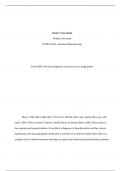Week 7 Case Study
Walden University
NURS 6521N- Advanced Pharmacology
Scored 98% with this assignment. Instructor was a tough grader.
Mary’s TSH (20) is high, MCV (78) is low, MCHC (26) is low, ferritin (9) is low, and
lastly, TIBC (418) is normal. From her current history of present illness (HPI), Mary seems to
have anemia and hypothyroidism. Given Mary’s diagnosis of hypothyroidism and her current
medications, the most appropriate medication to start her on would be levothyroxine which is a
synthetic form of thyroid hormone that helps to replace the deficient thyroid hormone in patients
,with hypothyroidism. The goal of therapy is to restore Mary to a euthyroid state which can be
readily accomplished in almost all patients by the oral administration of synthetic thyroxine
(UpToDate, 2024).
Levothyroxine (Synthroid) is the standard of care for the treatment and replacement of
hypothyroidism (UCLA Health, 2024). It is also called LT4 and is the equivalent of the natural
form of thyroid hormone produced by the body. I would start Mary with a low dose of
Levothyroxine 25 mcg once daily since she is young rather than 12.5 mcg which would be the
preferred starting dose for the elderly. (Medscape, 2024). During her follow-up, her dose will be
gradually increased based on her TSH, T3, AND T4 blood levels.
To monitor Mary’s response to levothyroxine, I would check her thyroid function tests
regularly, specifically, her TSH levels. The goal of treatment is to normalize her TSH levels,
typically aiming for a TSH within the normal range (0.4-5.0 mIU/L). TSH is produced in the
pituitary gland in response to low levels of thyroid hormones in the blood. In addition to
monitoring her thyroid level, Mary’s symptoms and overall well-being will be assessed such as
fatigue, dry skin, cold intolerance, and constipation (UCLA Health, 2024). By tracking these
improvements, the effectiveness of her medication will tell if her symptoms are improving or
not.
In terms of education, the timing of meals relative to taking levothyroxine can affect the
rate at which the medication is absorbed (Drugs.com, 2024). Therefore, Mary will be taught to
take this medication on a consistent schedule every morning before meals and to avoid large
fluctuations in her blood levels. Mary will be also taught to take her levothyroxine on an empty
stomach at least 30 minutes before breakfast or any other medications to ensure optimal
, absorption. She would be taught to avoid taking levothyroxine with calcium supplements, iron
supplements, or antacids containing aluminum or magnesium.
According to Medscape, (2024) and Drug.com, (2024), levothyroxine and Ibuprofen
when taken together do not have any interactions but I would advise Mary to take Ibuprofen
cautiously. Since she is taking Ibuprofen 400 mg once daily as needed, there is no need to
readjust her dose as this is a low dose for ibuprofen. Also, according to Medscape, (2024),
Ethinyl estradiol/levonorgestrel (combined oral contraceptive) does not have any interaction with
levothyroxine but Mary will be taught to take this medication with caution. Lastly, according to
Medscape, (2024), Kelp does not have any interactions with Levothyroxine, Ibuprofen, or her
combined oral contraceptives. Since she is taking Levothyroxine in the morning before breakfast,
she should have no problems taking her combined oral contraceptives at a different time during
the day. Including the kelp and ibuprofen.
Lastly, although not mentioned, Mary also has anemia. I would place her on some iron
pills based on her laboratory results and since she has a history of Iron deficiency anemia that
has not been treated. Her prescription will be ferrous sulfate 200 mg tablet orally, extended-
release once daily (Medscape, 2024).
First prescription
Patient’s name/DOB: Mary.
Patient’s age: 35
Patient allergies: NKDA. Licensee number: Contact information: Walden University, 888-969-
8601. Prescriber DEA number: 54321. Number of tablets to dispense: 33. Number of refills:
none. The patient will follow up after 30 days to assess treatment. Indication: hypothyroidism.
Rx: Medication / Strength / Frequency/dose: Levothyroxine 25 mcg by mouth, once daily.




